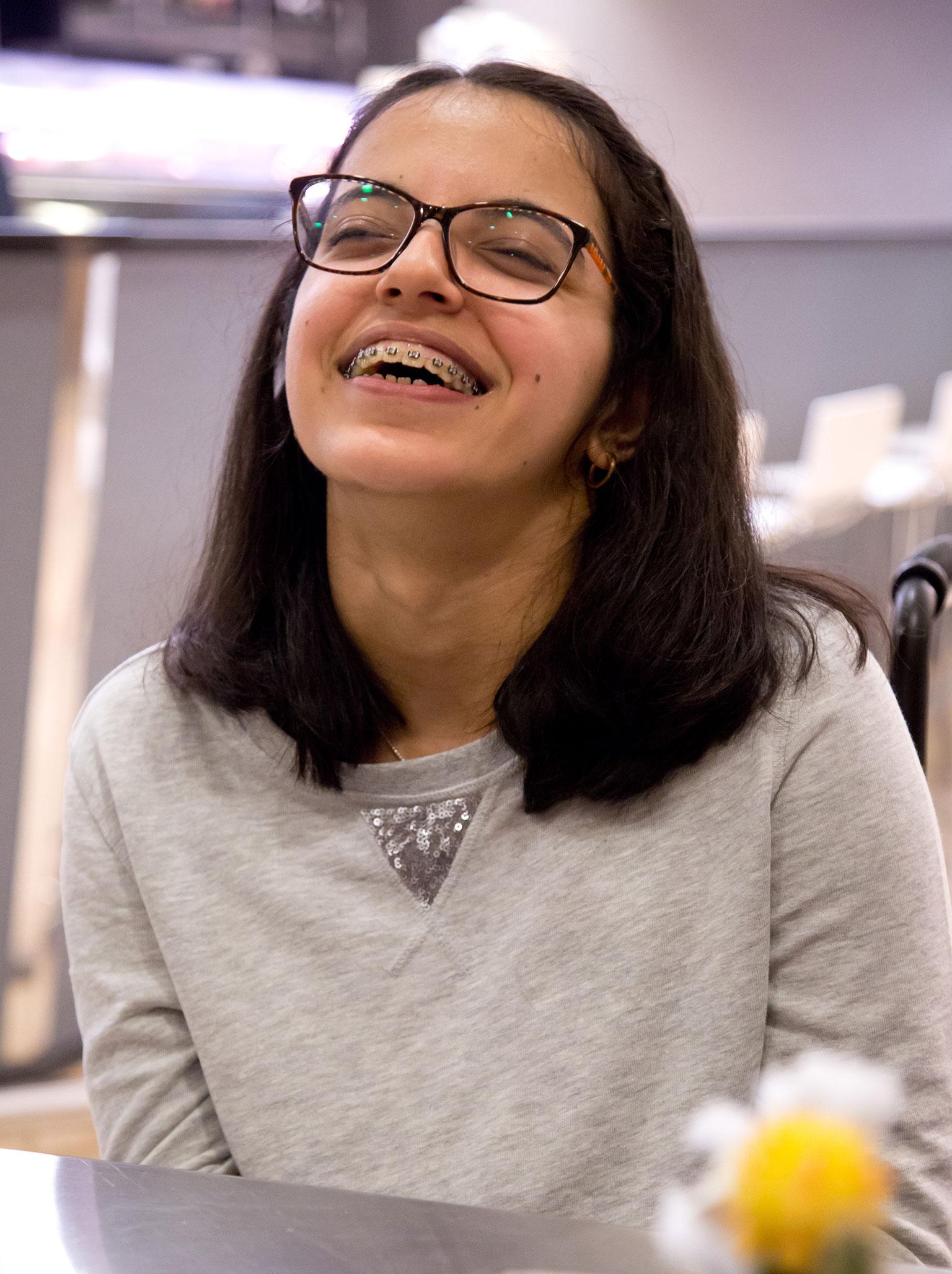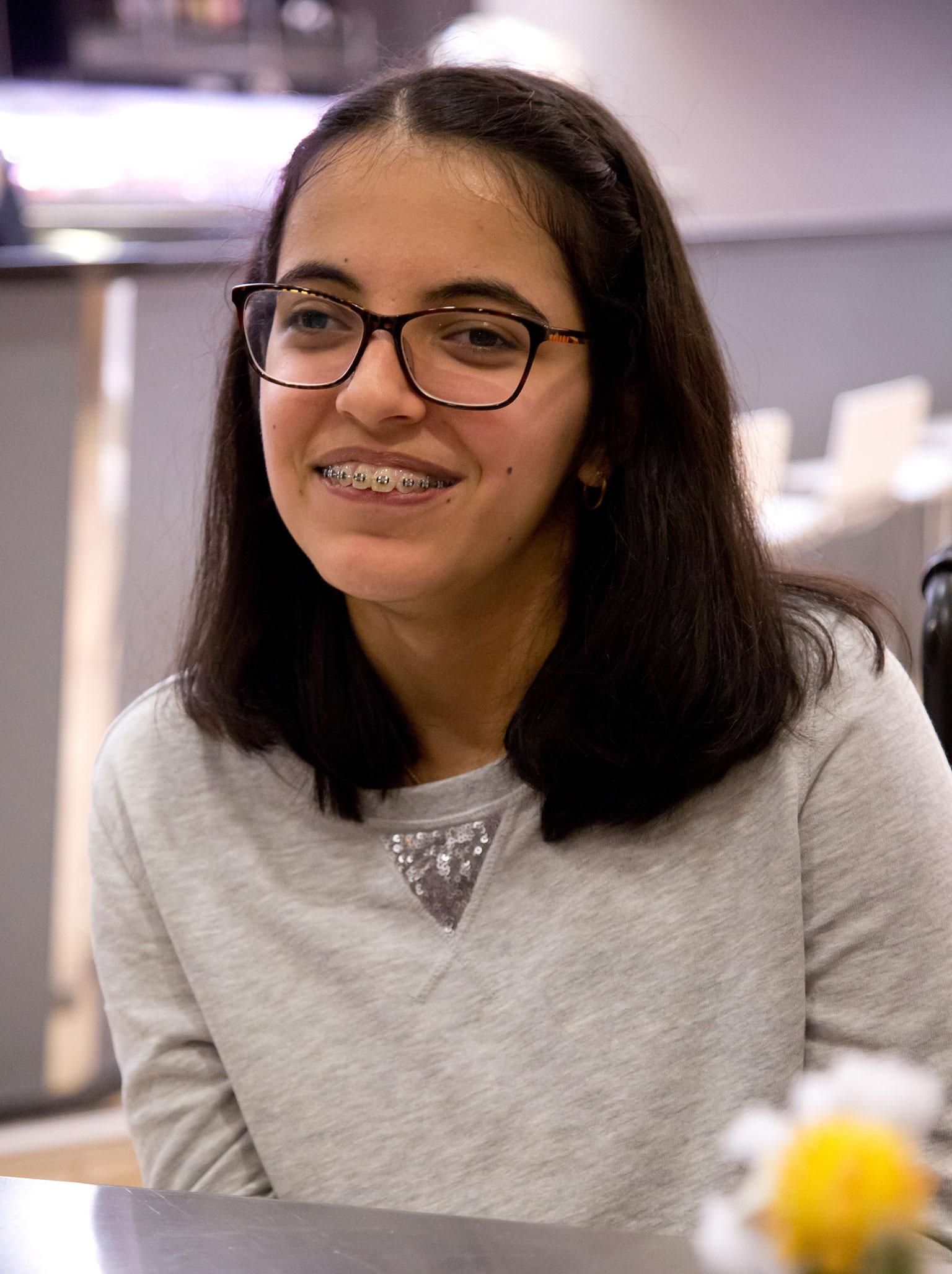From civil war to meeting Messi, how Barcelona made one Syrian refugee's dreams come true
18-year-old Nujeen Mustafa, who suffers from a form of Cerebral Palsy, began a 3,500-mile journey through eight countries to escape the war back in 2015

Your support helps us to tell the story
From reproductive rights to climate change to Big Tech, The Independent is on the ground when the story is developing. Whether it's investigating the financials of Elon Musk's pro-Trump PAC or producing our latest documentary, 'The A Word', which shines a light on the American women fighting for reproductive rights, we know how important it is to parse out the facts from the messaging.
At such a critical moment in US history, we need reporters on the ground. Your donation allows us to keep sending journalists to speak to both sides of the story.
The Independent is trusted by Americans across the entire political spectrum. And unlike many other quality news outlets, we choose not to lock Americans out of our reporting and analysis with paywalls. We believe quality journalism should be available to everyone, paid for by those who can afford it.
Your support makes all the difference.Syrian refugee Nujeen Mustafa will have even more reason to cheer on Barcelona in Saturday’s Clasico after the club made one of her dreams come true.
Inspired by the story of the 18-year-old, who suffers from a form of Cerebral Palsy, two weeks ago they surprised her by picking her up from her home in Cologne in the Barça team bus and bringing her to Catalonia where she met Lionel Messi and the rest of the players.
"Watching football was always a ritual in our house," she says of a life back in Syria that she left behind when she began a 3,500-mile journey through eight countries to escape the war in 2015.
She fled with her siblings when Isis set up base in Raqqa, just 100 miles from where she was living with her family, but her medical condition meant that her escape through Turkey, Greece, Macedonia, Serbia, Hungary, Croatia, Slovenia and Austria, before eventually reaching Germany, had to be made in her wheelchair.
"We are crazy about football," she tells me sat in a Barcelona café across the street from the Camp Nou where she has just taken part in the formal launch of Barcelona’s Christmas campaign as its inspiring image.
"You wouldn’t believe it. When there is a Euros or a World Cup we hang the flags of the competing nations on the balconies. You could see which neighbour of yours was supporting which country. I feel sorry for England. It must be really hard for the birthplace of football to only have one World Cup."
If the comment sounds like a dig, that’s because it is. Nujeen has a spiky sense of humour, part of a mix of tough human qualities that saw her talk her way through border after border until she made it with her sister, in the wheelchair, to asylum in Germany.
It was at the Hungary-Serbia border that she met, and subsequently wrote a book with, the Times journalist Christina Lamb. That is how Barcelona became aware of her story and the small part the club played in it.
"Watching Barça was a big part of my childhood and some of the happiest parts of my life have been because of watching them," she says.

"They were especially amazing in the 2008-09 season. In Syria it is only one hour later than European time and I was lucky that back then I did not have school so I could stay up and watch the games.
"The Chelsea semi-final from 2009 stands out. It was so nerve-racking I was holding my breath a lot of the time. I was almost crying when Iniesta scored in injury time. I can just remember screaming. It was a special time when Pep Guardiola was the manager."
Those memories are recorded in the book she wrote with Lamb. "Someone had told her that a girl in a wheelchair was speaking perfect English and that she wanted to be an astronaut," Nujeen says of her first meeting with the journalist.
"When I got to Germany we got back in contact and we met and we came up with the idea of the book. I was really excited because I am a bookworm myself. I love writing and I liked the idea of having the responsibility of conveying the message of what is happening in Syria from my perspective as a Kurd, as a person with a disability, as a refugee, and as a girl. It was exciting but it was also nerve-racking because it was a big responsibility to do justice to Syria."
After Barcelona sent their team bus all the way to Cologne to pick her up Nujeen and her sister were driven to the Camp Nou where she watched the team play Celta Vigo and then met the players.
"I had no idea what was going on when I saw the bus,’ she says. ‘I was thinking: are the players going to come out or something? Then I was just happy that I was going to visit the Camp Nou to watch the game. I didn’t know that I would meet them too.
"When I met them I had this weird feeling of knowing them because I have grown up watching this generation. I played it casual. I asked Messi about his wife and kids and I asked Pique about Shakira.
"I didn’t want to be too fawning. Because I think that must be horrible for them. I wanted it to be like when you meet someone you have not seen for a long time. How are you doing? Are you okay? How’s your job? Which in this case translates as: 'You have to do well in the Clasico. I will be really sad if you lose'."
Asked who her favourite player was before meeting the team and if that had changed since she says: "Of course everyone’s favourite is Messi. He’s still a shy guy. You would never believe he is one of the best players in the world.
"I am really happy to have met Iniesta. He still has a really special place in my heart because he scored the goal that earned the Spanish team the World Cup. And I wanted Spain to win so badly. He has the personality of a leader. I liked meeting him. And Luis Suarez too. He is a very quiet person. You would expect him to be nervous and grumpy but he was really nice."
There is still so much raw emotion when Nujeen talks about her journey from Syria to Germany. Once she had made it to the Turkish/Syrian border to the coastal town of Bodrum the family paid smugglers to take them in a dinghy to the Greek island of Lesbos.
"We were pretty lucky, even though the waves were really high,’ she tells me. ‘It was the same day that the body of the Syrian boy [Alan Kurdi] was washed up to the shore. We were informed of that after we landed.
"Some people told us that some people had died having set off from another place. It was usual for boats designed for 15 people to be stuck, and with up to 50 people in them.
"We were able to pay extra money for the boat to be our own, which I think helped. Our group was really nervous about bringing the wheelchair because some were afraid that it would puncture the boat but I could not possibly have been carried in those very difficult conditions.
"I was completely aware that his might be my grave. But I believed in our chance for a new life and a chance to move on and live without the fear of dying tomorrow.’"
Having experienced first hand what refugees suffer how does she feel now living in Europe when she says the way the topic is addressed in the news?
"It hurts because refugees are reported as a problem that needs solving and as numbers that appear on news reports, and yet we are people," she says.
"It was not a choice for us to leave. But that motivates me to keep trying to improve the image of the refugees and correcting the misconceptions. Trying to get back to the original meaning of the word ‘refugee’ as a person needing help. It’s not a plague or a disease to be feared."
She left her mother, father and one sister behind. "My sister is still in Syria with her husband. It’s hard to get in contact with her," she says. "It’s quieter now but the hardest thing to deal with is that you have nothing to look forward to. There is no future for young people or for children."

Thoughts of those back in Syria bring her back to the subject of Barcelona and how watching football gave her some joy and relief from the struggles of living in a country torn apart by war.
Back in Germany she wants to study physics and still dreams of becoming an astronaut. "It would be nice to see Barcelona play a game in Syria one day," she says. "I hope I will be there to see it.
"We were so proud of our diversity before and our acceptance of one another. My sister says that she would often not realise that her closest school friends were of another faith or ethnicity. So I wish we could just love one again."
As our conversation comes to an end night has fallen over the Camp Nou across the busy Travessera de les Corts. Nujeen is off to Germany again the next day. "Flying this time, not on the team-bus," she laughs. She will be back home in plenty of time to see the Clasico, the game that ‘stops the world’ they say.
In one sense she is a reminder of all the things that make football insignificant. She also proves the opposite is true because in spite of all that she has been through it clearly matters to her.
Join our commenting forum
Join thought-provoking conversations, follow other Independent readers and see their replies
Comments